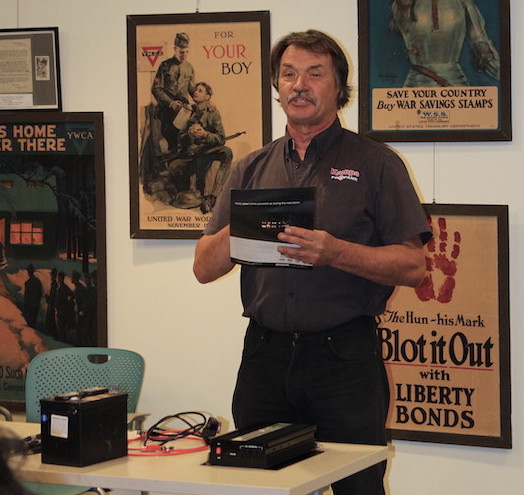
It took almost 20 days to completely extinguish the September Valley Fire that burned 16,390 acres, plenty of time for East County residents to consider purchasing a backup generator capable of maintaining their power supply in times of emergency.
Bay City Electric Works Vice President Austin Lee, whose company supplies generators to dealers throughout California for commercial and industrial installation said most of San Diego county has what he calls a reliable grid but East County stands out with a specialized need for sustainable power when wildfires hit the area.
“In East County, where wildfires are more of a risk, power has been shut down more regularly over the past few years. Residents learn really quickly about their needs. Two of the most common needs in the area are power for a well pump for agricultural needs and horses, and baseline power for medical needs,” Lee said.
Triple S Electric owner Jeff Simonides is an electrical contractor who installs generators; he is also an East County resident who is familiar with the planned and unplanned power outages that he believes are more frequent in this part of the county.
“A lot of the homes out here have sprinkler systems that won’t work unless they have power,” Simonides said.
He also mentioned adequate lighting for elderly residents as top of his list, and said animals needing water is a huge concern.
“Backcountry residents are on a well and without power, those wells aren’t going to work which means people growing anything or keeping animals are completely without water. Animals are always a victim of our poor planning,” Simonides said.
Alpine resident Richard Edwords works as an Account Executive at Kamp’s Propane and said he has seen an increase in locals purchasing propane to power a generator, one indication that residents have learned from wildfire incidents but has also noticed customers skimping on generators that ultimately harm computerized appliances.
“One of the things that’s affecting a lot of my customers is they’re buying cheaper, portable generators that are surging. The Hertz, which is how we measure frequency are a little off-tilt. If that frequency is off, it can damage your power supply. It’s especially important for Energy Star appliances that have computers,” Edwords said.
Another issue he frequently sees are customers who load too many appliances on one circuit. He compared the situation to a car that comfortably runs at 70 miles per hour.
“A generator should be run at 70% load. If you require 10,000 watts of power, you don’t want to buy a 10K generator or you’ll overload. It would be like running a car at full throttle all day long. Buy bigger and run your generator comfortably,” Edwords said.
Lee also said anyone thinking of hiring an electrician to install a full generator system needs to keep future growth in mind.
“Things have changed— people have multiple devices, laptops, cellular phones, people and businesses are working from home. We’re looking at the future, people buying electric cars, these social changes are driving awareness of a backup system,” Lee said.
Just as coastal homes from 25 years ago didn’t necessarily include air conditioning, Lee said, homes today don’t necessarily include a generator but it is becoming part of the conversation as wildfires arise more frequently.
Lee said even in East County, the size and type of generator can be different from neighborhood to neighborhood because of local sound requirements for fully installed generator systems.
“If you have three acres in Lakeside and you can’t see your neighbors house that’s one thing; in La Mesa a permanently installed system, about the size of two air conditioning units that will come on automatically when the power goes off might involve different permits because something that size is going to have different requirements due to sound,” Lee said.
Simonides said he is a regular electrical contractor and doesn’t push people to buy generators but he has increasingly taken on generator installation projects over the past year and sees the need, often bringing up ‘what-if’ situations that customers don’t consider.
“For example, I run into customers who have an electric gate. Without power, there is no way for them to get out of that gate or for the fire department to get in. We always put that on backup power. Without a way to get through, the fire department is going to end up tearing down their beautiful wrought iron gate,” Simonides said.
Edwords also said East County residents should also educate themselves on fuel storage for their generator as they’re deciding what size and type of generator to purchase.
“There’s basically four ways to fuel a generator: a diesel system uses a lot less fuel than gasoline; gasoline fuel is pretty cheap but goes bad after as little as three months; natural gas runs great but it’s difficult to purchase as a portable type fuel; propane is cheaper than diesel and it can go right in a BBQ container,” Edwords said.
If the power goes out, residents won’t be able to buy gasoline as stores shut down, he cautioned.
“Then again,” Edwords said, “nowadays, if you live in a rural area, you have to get to a certain degree of being able to prepare in advance because those fires keep on coming.”













